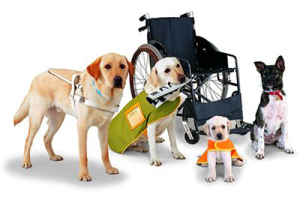
TYPES OF SERVICE ANIMALS
This page will help you determine which animal service type you best qualify for and then point you in the proper direction for registering your service animal.
Service Animal
Service animals are dogs (and in some cases, miniature horses) trained to perform major life tasks to assist people with physical disabilities. Service animals are sometimes referred to as assistance animals, assist animals, support animals, or helper animals depending on the country and the animal’s function.
For a person to legally qualify to have a service dog, he/she must have a disability that substantially limits his/her ability to perform at least one major life task without assistance.
To qualify as a service dog, the dog must be individually trained to perform that major life task. All breeds and sizes of dogs can be trained as service animals.
Click here to find out about the laws protecting you and your Service Dog.
Click here to register your Service Dog.
Click here to register your SERVICE DOG with the United States Animal Registrar Service Dog Registry
Psychiatric Service Dogs (PSD)
A Psychiatric Service animal is a dog that is individually trained for people with an emotional or psychiatric disability so severe that it substantially limits his/her ability to perform at least one major life task. PSDs are considered service animals.
To legally qualify, a PSD must be prescribed for a person by his/her licensed therapist (a licensed mental health professional) in a properly formatted letter that specifically states that a PSD is needed to perform necessary tasks that the person is unable to perform for him/herself during certain events.
If you have no therapist or your therapist is unwilling to write such a letter, we recommend using Chilhowee Psychological Services; a licensed and legitimate mental health agency who specializes in online disability assessments and offers a letter of prescription to clients who qualify: http://www.cptas.com
Federal law (ADA, Fair Housing Act, Air Carrier Access Act) protects you to be accompanied by your dog anywhere that a person would normally go. This also includes “no pet” housing and flying in the cabin of an aircraft with no fee for the dog.
Click here to find out about the laws protecting you and your Psychiatric Service Dog.
Click here to register your Psychiatric Service Dog.
Emotional Support Animals (ESA)
An emotional support animal (ESA) is an animal that has been prescribed for a person by his/her licensed therapist (a licensed mental health professional) in a properly formatted letter. This letter should state that the person is determined to be emotionally or psychiatrically disabled and that the presence of the animal is necessary for the disabled person’s mental health. If you have no therapist or your therapist is unwilling to write such a letter, we recommend using Chilhowee Psychological Services; a licensed and legitimate mental health agency who specializes in online disability assessments and offers a letter of prescription to clients who qualify: http://www.cptas.com
ESAs are also sometimes referred to as comfort animals, comfort pets, or companion animals. Dogs, cats, rabbits, birds, mini-pigs, hedgehogs, and many more species may qualify as an ESA. These animals do not require specific task-training because it is the very presence of the animal that mitigates the negative symptoms associated with a person’s disorder. An ESA can be any age.
Although the law does not exclude any particular species from qualifying as an ESA, commonsense will nearly always prevail. For example, despite there not being written exclusions, if an emotionally disabled airline passenger wants to to be accompanied in the cabin of the aircraft by his ESA and the ESA is full sized goat, the airlines will likely require the goat to be crated and travel in “cargo”. Similarly, a landlord would likely be able to successfully defend the rejection of a tenant with a hippo as an ESA.
Click here to find out about the laws protecting you and your ESA.
Click here to register your ESA.
Therapy Animals
Many people confuse Therapy Animals with Service Dogs. A therapy animal is normally a dog (but can be other species) that has been obedience trained and screened for its ability to interact favorably with humans and other animals. The primary purpose of a therapy dog is to provide affection and comfort to people in hospitals, retirement homes, nursing homes, schools, hospices, disaster areas, and to people with learning difficulties.
Therapy animals may be classified into three different types:
Therapeutic Visitation
- The first (and most common) are “Therapeutic Visitation” animals. These dogs are household pets whose owners take time to visit hospitals, nursing homes, detention facilities, and rehabilitation facilities. Visitation dogs help people who have to be away from home due to mental or physical illness or court order. These people often miss their own pets, and a visit from a visitation animal can brighten the day, lift spirits, and help motivate them in their therapy or treatment with the goal of going home to see their own pets.
Animal Assisted Therapy
- The second type of therapy animal is called an “Animal Assisted Therapy” animal. These animals assist physical and occupational therapists in meeting goals important to a person’s recovery. Tasks that a dog can help achieve include gaining motion in limbs, fine motor control, or regaining pet care skills for caring for pets at home. Animal Assisted Therapy animal usually work in rehabilitation facilities.
Facility Therapy
- The third type of therapy animal is called a “Facility Therapy Animal”. These dogs primarily work in nursing homes and are often trained to help keep patients with Alzheimer’s disease or other mental illness from getting into trouble. They are handled by a trained member of the staff and live at the facility.
Therapy Animals must:
- Be well tempered
- Not shed excessively
- Well socialized (exposed to many environments)
- Love to cheer others up
Click here to register your Therapy Dog.
Click here to find out about the laws protecting you and your Therapy Dog.
Click here to register your THERAPY DOG with the United States Animal Registrar THERAPY Dog Registry
THERAPY DOGS MUST BE REGISTERED
[btnsx id=”178″]
